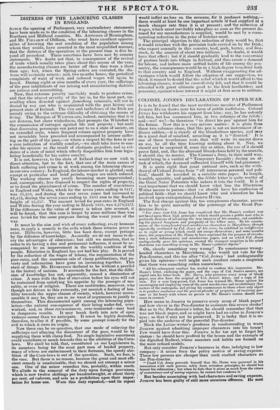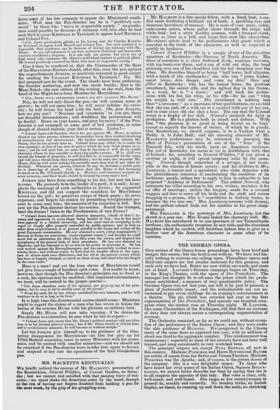at- tack of which, the deceased suffocated himself with bad
grammar."
It is quite right that great national acts, such as the with- drawal of Colonel JONES from " all intercourse personal and poli- tical," should be recorded in a suitable state paper. In length, breadth, quantity, and quality, the Globe letter is quite worthy of the Great Noisy Potentate who ushers it into the world. It is of vast importance that we should know what line the Illustrious Writer means to pursue—that we should bare his confession of political faith—that we should know why and wherefore he has resolved upon extinguishing JOSEPH HUME.
The first charge against this too conspicuous character, proves him to be quite unworthy of the patronage of the Great Pen- director JONES.
" For some time Col. Jones has considered that Mr. Hume's conduct was not based upon those high principles which should govern a public man who is positively desirous of advancing the true interests of his country, and establish- ing the general happiness and prosperity of his fellow man. By his counte- nance of the wrongheaded and mischievous characters in Marylebone, though repeatedly cautioned by Col. Jones of his error, he exhibited an indifference as to right or wrong which could not escape observation ; and some months since, the proposition of Mr. Home to have reprinted for the purpose of circula- tion a most inflammatory and mischievous paper, and on which Col. ,Tones undisguisedly gave his opinions, created the strongest suspicion in his mind that there was something wrong in Mr. Hume's political objects."
Oh, clearly something very wrong! To countenance wrong- headed characters in Marylebone, who would not vote for the Pen-director, and this too after "Col. JONES " had undisguisedly given his opinions—well might such conduct create a suspicion that there was something rotten somewhere.
" All his subsequent conduct has tended to confirm this impression. Mr. Hume's letter, enclosing the paper, and the copy of Col. Jones's answer, are copied into his letter-hook. Mr. Hume, who preserves every scrap of blank paper, may also have the original of Col. Jones's letter, and a copy of his own. For a very long period, Col. Jones has warned Mr. Hume against his encouraging and employing some of the most mischievous and revolutionary cha- racters of the metropolis, and giving his countenance to those whose only object is to produce confusion and the general plunder of property; of receiving per- sons at his house with whom no person in Mr. Hume's station should ever come in contact."
How mean in JOSEPH to preserve every scrap of blank paper! and how clever in the Pen-director to insinuate this severe stroke! But as to the Pen-director's letter, he should remember that that was not blank paper, and so might have had no value in JOSEPH'S eyes; so that it may not be preserved. It is lucky that it is co- pied into the archives of the powerful Pen-director. Mark the Letter-writer's goodness in condescending to warn JOSEPH against admitting improper characters into his house! Few would have done this. JOSEPH is far too apt to forget his station : he should have profited by the lesson and the example of the dignified Radical, whose manners and habits are formed on the most refined models.
But only consider JOSEPH'S baseness in thus indulging in low company : it arises from the paltry motive of saving expense.' These low persons are cheaper than such exalted characters as the Pen-director.
" Could Col. Jones persuade himself that Mr. Hume was governed in his association with such persons solely from mistaken principles, he should but lament his infatuation ; but when he feels that it arises as much from the views of convenience and of saving expense, he cannot but condemn it."
But besides associating with bad characters and saving expense, JosEPH has been guilty of still more atrocious offences. He sent
down some of his low company to oppose the Ministerial candi- dates. Well may the Pen-director say he is " positively cen- sured " by those who " move in respectable society ." no gentle- man could possibly be desirous of intimacy with him after he had sent Sir CHARLES KNOWLES to Tavistock to oppose Lord RUSSELL and Colonel Fox. 44 Col. Jones particularly .alludes to his having sent Sir Charles Knowles to Tavistoek to oppose Lord 'Russell and Colonel Fox. For such conduct it is impossible that gentlemen can be desirous of having any intimacy with Mr. Hume. As yet, all refinement is not lost, sentiment abolished, and honourable conduct considered a disgrace. It is not only one person, but every one of high mind, who condemns Mr. Hume's individual conduct in political affairs. He is most positively censured by those who move in respectable society." Can it then be wondered at, that the Commander of the Rear of the Mary lebone Electors should, after this, raise the pen against the ungentlemanly JOSEPH, so positively censured in good society for sending Sir CHARLES KNOWLES to Tavistock? No. We feel prepared now for the event. The clouds have been gathering, the thunder muttering, and now the storm breaks: here is the Mene Tekel—the new edition of the writing on the wall, from the hand of the Might-have-been Member for Marylebone- 44 COL. JONES WILL THEREFORE DIRECT HIS TEN AGAINST MR. HUME."
Nay, he will not only direct the pen—he 'will assume noms de guerre; he will not spare him ; he will never indulge his curio- sity; he will bruise his head with his heel. Oh, poor JOSEPH, how we pity you! " Noxious and venomous " as you are, these are dreadful denunciations ; and doubtless the persecutions will be fearful. Down on your knees, and pray for mercy ! if the Pen- director is not swamped in some pool of bad grammar, or some slough of .absurd rhetoric, your fate is certain. Listen!- " Colonel Jones will therefore direct his pen against Mr. Hume, as against thost or any other persons, whenever he considers his or their conduct deserving of animadversion and chastisement. He further unhesitatingly informs Mr. Hume, that he has already done so. Colonel Jones may either do so under his own signature, or that of any nom de guerre which he may think proper to as- sume ; and he will spare him no more than he has done or will do any public character whom he may consider as deserving public censure. If he shall ever exceed the bounds of propriety, he will feel that he is responsible for the same, and will never shrink from that responsibility ; but he must also acquaint Mr. Hume, that he will never indulge his curiosity more than that of any other in- dividual. Whenever any person, whoever he may be, becomes a public pest,
be is deserving of attack. Col. Jones fears Mr. Hume is fast becoming as much so as Mr. O'Connell already is. Noxious and venomous animals de- serve no mercy, and their heads should be bruised by every man's heel."
JOSEPH may have done something in his day, but now his hour is come. He pretends to be the leader of a party, it is said ; he ne- glects the warnings of such authorities as JONES; he supported KNowLEs, and did not support the candidate for Marylebone lowest on the poll; he preserves scraps of blank paper ; he saves expenses, and forgets his station by permitting wrongheaded per- sons to come near him; the measure of his iniquities is full. But now let the Pen-director declare his notions. Sound the trumpet, beat the drums ! listen to the Proclamation of THE JONES " Colonel Jones has ever abhorred absolute monarchy, [think of that !J ty- ranny and oppression in every shape being hateful to him; but he has never been opposed to a limited monarchy, and has never had an antipathy to the regal or kingly office properly controlled by public opinion; and he feels no other form of government is at present suitable to the wants and wishes of the great European communities. He ever shunned a court, [what magnanimity !] because its forms are wearisome, [most exquisite reason !] and because he could never feel an admiration for those who then wore the crown, and despised the sycophancy of the general body of their attendants. He has ever detested an oligarchy, and has laboured as far as was in his power to overcome it. He has ever warred against the Boroughmongers, and has successfully worked to over- whelm them ; and without vanity he feels that his humble efforts in the expo- sure of abuses made more Reformers, and has led to the general victory which has been so happily obtained, as much as those of any individual who has fought in the same ranks."
Here is a man! and yet the base slaves of Marylebone would not give him a couple of hundred split-votes. It is useful to know, however, that though the Pen-director's principles are as fixed as a rock, his opinions may be modified : this important circumstance, we trust, will be noticed in the proper.quarter- " Col. Jones abandons none of his opinions, nor gives up any of his prin- ciples; but he may be led to modify some of the former."
" From his early life he has always sacrificed his own interests, and he will continue to do so as long as he lives."
It is high time this disinterested course should cease : Ministers ought to regard the claims of a man who has sworn to bruise the brains of the noxious Hums with his glorious ex-military heel.
Surely Mr. HUME will now take warning : if he drives the Pen-director to extremities, he sees what he has to expect- " Colonel Jones only trusts that Mr. Hume's political conduct will not drive him to be his decided political enemy ; but if Mr. Hume should at all lend him- self to revolutionary measures, he will become so without scruple."
Let but JOSEPH give himself up to the guidance of the blus- tering disappointee for Marylebone—let him but give up his Ultra-Radical associates, cease to annoy Ministers with his econo- mics, and be content with smaller minorities—and we should not be surprised if the Pen-director were to take him again to favour, and suspend at any rate the operations of the fatal blunderbuss pen.





















 Previous page
Previous page